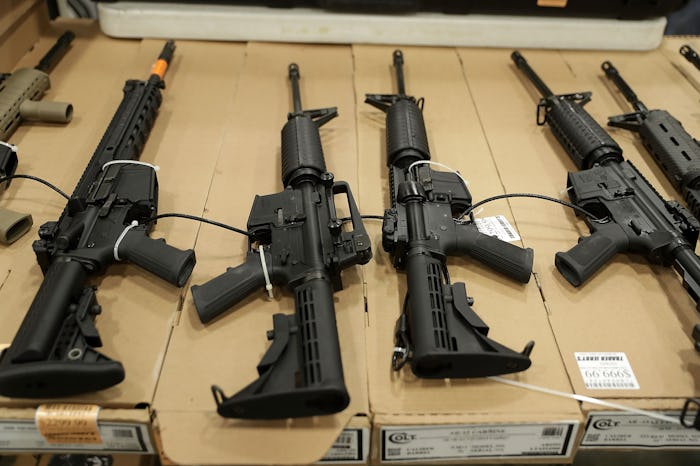News

What Are Virginia's Gun Laws?
On Wednesday, a man thought to have been carrying an assault rifle opened fire at a Republican congressional baseball practice in Alexandria, Virginia, injuring Louisiana Rep. Steve Scalise and at least four others, according to CBS News. While further details are still being confirmed, the shooting has left many thinking about ongoing debate regarding gun safety laws, and what might be needed to keep these kinds of shootings for happening. What are Virginia's gun laws? They're not exactly strict.
As much as Wednesday's shooting shocked the nation, it's certainly not the first time that the state has experienced a high-profile mass shooting. It's been 10 years now since the 2007 Virginia Tech shooting that left 32 people dead, according to CNN — the deadliest mass shooting in the United States until 2016's Pulse nightclub shooting in Orlando, Florida, took that gut-wrenching title. At the time, outraged Americans called for stricter gun safety laws in the hopes that government legislation could help put an end to the senseless violence (a debate that was re-ignited after 2012's Sandy Hook shooting at Newtown Elementary School in Connecticut, and which occurs again every time someone has attempted to use a gun to kill as many people as they possibly could for no good reason whatsoever). But the laws surrounding gun ownership in Virginia aren't actually a whole lot different now than they were a decade ago, and in some ways they've become even looser than they once were.
According to USA Today, part of the difficulty surrounding legislating gun ownership in states like Virginia is that the debate around how best to actually reduce gun violence is fiercely divided. While many have called on their elected officials to introduce laws that would, for example, require mandatory background checks whenever a gun is purchased, others have lobbied to make gun ownership easier, arguing that people would be safer if they were armed and could protect themselves, and that civilians could help intervene in a mass shooting if they were able to carry weapons.
And it's not just in Virginia: according to USA Today, in the years following the Virginia Tech shooting, a number of states passed laws that allow gun owners to carry weapons without permits, and 10 states currently also allow the carrying of concealed weapons on college campuses, according to the National Conference of State Legislatures. Virginia isn't one of them, but it hasn't banned concealed weapons, either: according to the NCSL, in Virginia and 23 other states, the the decision to ban or allow concealed carry weapons on campuses is ultimately one left to each individual institution.
In fact, Virginia doesn't seem to have many restrictions in place when it comes to gun ownership at all. According to the National Rifle Association's Institute for Legislative Action, permits are not required to purchase a handgun or rifle in Virginia, and you are neither required to have a gun license or to register your firearm (though you do need a permit to carry a handgun). According to The Washington Post, the state has also done away with its one-time, one-gun-a-month limit on purchasing handguns, and concealed weapons are now legal in bars and restaurants.
While the details surrounding gun laws vary from state to state, Virginia seems like a fairly gun-friendly state when compared to other areas of the country. In 2015, Guns and Ammo magazine ranked Virginia 24th in its list of the best states for gun owners (it won points for its open carry laws, but was criticized by the magazine for prohibiting the possession of "tactical-looking rifles" by anyone under 18), while The Brady Campaign To Prevent Gun Violence ranked the state 7th out of it's list of 15 states with the weakest gun laws.
Depending on where you stand on the gun safety debate, that assessment could be either good or bad news — especially in light of what happened in Alexandria Wednesday. For those worried about the relative ease with which guns can be purchased, owned, and carried around in Virginia, the shooting will no doubt further reinforce the idea that more needs to be done to ensure that guns don't end up in the hands of the wrong people. For others, the shooting is an example of why gun ownership is necessary for protection, except that argument doesn't appear to work in this case because the shooter was ultimately taken down by armed and trained Capitol Hill police officers who were in attendance at the practice, according to MSNBC.
The one thing that we can hopefully at least all agree on though? That no matter what your beliefs are regarding gun legislation, gun violence is a problem that needs to be addressed immediately. Because it seems that so long as gun safety continues to be a polarizing partisan issue, innocent people are going to continue to be victims.